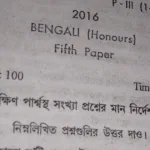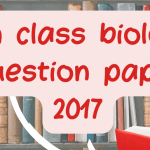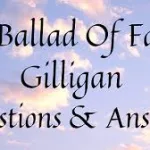Bengali Honours question paper from 2016 focuses on important topics in Bengali literature, grammar, and writing. This guide covers 50 detailed questions and answers, offering insights into the exam. Designed to help students grasp key concepts and enhance preparation for Bengali Honours exams.
Bengali Literature Questions and Answers
Question: What is the significance of Rabindranath Tagore’s “Gitanjali” in Bengali literature?
Answer: “Gitanjali” is a collection of poems by Rabindranath Tagore that reflects spiritual themes and human emotions. It won the Nobel Prize in 1913, symbolizing global recognition of Bengali literature.
Question: Who is known as the ‘Father of Bengali Literature’?
Answer: Ishwar Chandra Vidyasagar is regarded as the ‘Father of Bengali Literature’ for his contributions to education, prose writing, and social reforms in Bengal.
Question: Name a key work by Bankim Chandra Chattopadhyay.
Answer: “Anandamath” is a key work by Bankim Chandra Chattopadhyay, known for its patriotic themes and the song “Vande Mataram”.
Question: Explain the central theme of Michael Madhusudan Dutt’s “Meghnad Badh Kavya”.
Answer: “Meghnad Badh Kavya” portrays the story of Meghnad, Ravana’s son, from the Ramayana. It focuses on heroism, morality, and the tragic elements of war.
Question: What is the contribution of Vidyasagar in Bengali prose?
Answer: Vidyasagar modernized Bengali prose with simplicity, clarity, and logical expression, making it accessible to the common people.
Question: What role did Sarat Chandra Chattopadhyay play in Bengali literature?
Answer: Sarat Chandra Chattopadhyay focused on social issues and human emotions through novels like “Devdas” and “Srikanta”, influencing generations of Bengali readers.
Question: Discuss the poetic style of Jibanananda Das.
Answer: Jibanananda Das is known for his modernist style, surreal imagery, and themes of love, nature, and existentialism in his poetry.
Question: What is the importance of the “Bengali Renaissance” in literature?
Answer: The Bengali Renaissance was a cultural movement in the 19th century that revived Bengali literature, art, and thought, shaping its modern identity.
Question: What is the plot of Rabindranath Tagore’s play “Raktakarabi”?
Answer: “Raktakarabi” is a symbolic play about oppression, freedom, and human values set in an authoritarian regime, emphasizing the struggle for liberty.
Question: Who introduced blank verse in Bengali poetry?
Answer: Michael Madhusudan Dutt introduced blank verse in Bengali poetry, revolutionizing its structure and style.
Question: Define the literary style of Kazi Nazrul Islam.
Answer: Kazi Nazrul Islam’s literary style combines rebellion and romanticism, addressing themes of justice, love, and humanity in his works.
Question: What is the significance of “Vande Mataram” in Indian history?
Answer: “Vande Mataram” is a patriotic song from Bankim Chandra Chattopadhyay’s novel “Anandamath” that became a symbol of India’s independence movement.
Question: Name the first Bengali novel and its author.
Answer: “Alaler Gharer Dulal” by Pyarichand Mitra is considered the first Bengali novel.
Question: What is the central theme of Tagore’s “Chokher Bali”?
Answer: “Chokher Bali” explores themes of love, betrayal, and societal norms through the complex relationships of its characters.
Question: Who is the author of “Pather Panchali”?
Answer: Bibhutibhushan Bandopadhyay is the author of “Pather Panchali”, a novel about rural life and human emotions.
Question: Explain the symbolism in Tagore’s “The Post Office”.
Answer: “The Post Office” symbolizes freedom, spiritual awakening, and the acceptance of death as a natural part of life.
Question: What was the contribution of Satyajit Ray in Bengali literature?
Answer: Satyajit Ray contributed to Bengali literature with his detective stories, especially the “Feluda” series, and science fiction.
Question: Who is known as the ‘Nightingale of Bengal’?
Answer: Sarojini Naidu is referred to as the ‘Nightingale of Bengal’ for her lyrical poetry and contributions to Indian literature.
Question: What is the central conflict in “Debdas” by Sarat Chandra Chattopadhyay?
Answer: The central conflict in “Devdas” is the tragic love story of Devdas, highlighting societal pressures and personal weaknesses.
The Bengali Honours question paper from 2016 provides a deep insight into Bengali literature and its evolution over time. By exploring these questions and answers, students can prepare effectively, understand the subject better, and excel in exams. Bengali literature continues to inspire readers with its profound beauty and cultural richness.
Latest Posts
- Step-by-step guide to download and apply for jee mains admit card 202
- Comprehensive 2025 government holidays and recruitment details for job seekers
- JEE Mains Admit Card 2025: Your Step-by-Step Guide to Downloading the Hall Ticket
- Everything You Need to Know About 2025 Government Holidays Recruitment
- Comprehensive Guide to rrb d group recruitment 2025 – Eligibility, Vacancies, and Application
- Detailed guide to nps trust recruitment 2025 vacancies, eligibility and apply process
- Comprehensive guide to hpcl recruitment 2025 notification, vacancies, and application process
- ignou bed admission 2025 complete recruitment guide with eligibility and process
- Comprehensive Guide to Indian Army Agniveer Recruitment 2025 Notification and Jobs
- Everything You Must Know About CBSE Board Exams 2025 Changes & New Rules






